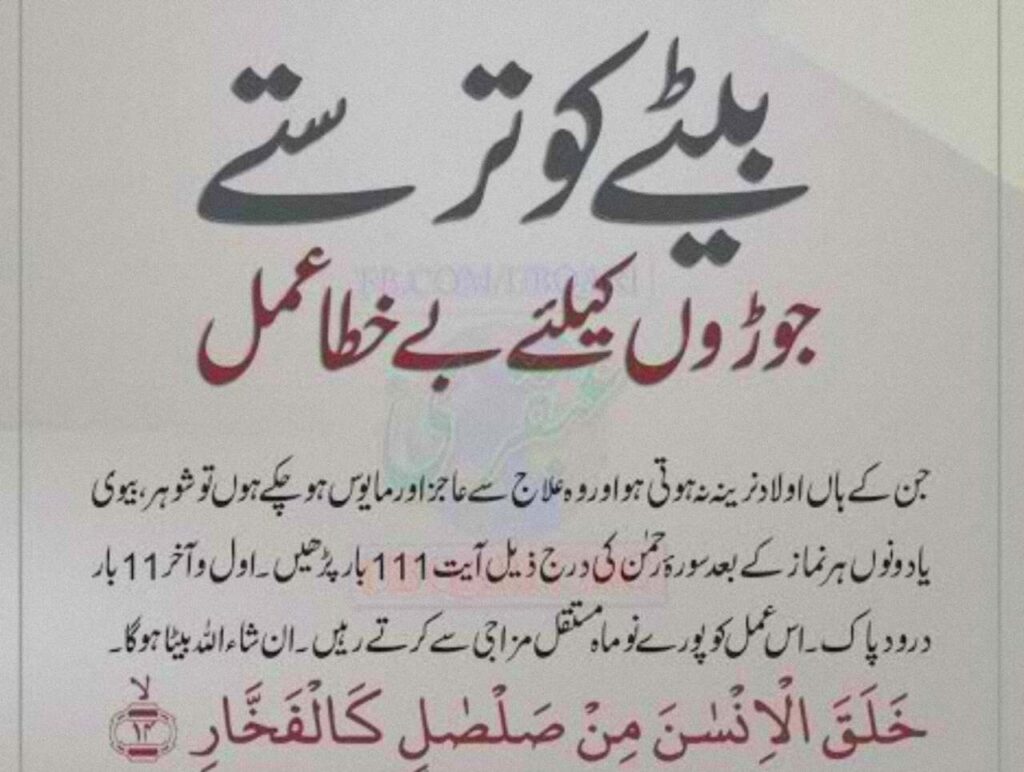Beta Hone ki Dua in Quran: The birth of a child, particularly a son, is a cherished desire for many parents. In the Islamic faith, children are considered a blessing from Allah (SWT), and the arrival of a son is often seen as a source of joy and continuation of the family lineage.
While the gender of a child is ultimately in the hands of Allah, Muslims are encouraged to supplicate and seek His blessings for a son through dua (prayer). This article explores the concept of beta hone ki dua in the Quran and provides guidance on the significance of this prayer in Islamic tradition. Let’s delve into the importance of this dua and its role in seeking Allah’s blessings for the birth of a son.
The Significance of Children in Islamic Faith:
Children hold a special place in the Islamic faith as a means of carrying on the family legacy and contributing to society. Both sons and daughters are considered a gift from Allah, and their arrival brings joy and fulfillment to parents. While the desire for a son is natural, it is essential to remember that the ultimate decision lies with Allah, who knows what is best for His creation.

The Power of Dua in Islamic Practice:
Dua, or supplication, is an integral part of Islamic practice. It is a means of communication between believers and Allah (SWT), allowing them to express their desires, seek guidance, and seek His blessings. Muslims are encouraged to engage in dua regularly, acknowledging their reliance on Allah’s mercy and seeking His intervention in various aspects of life. Dua serves as a powerful tool to establish a connection with the Creator and seek His favor and blessings.

Beta Hone Ki Dua in the Quran:
Although there is no specific dua mentioned in the Quran for the purpose of having a son, believers can turn to various verses for guidance and inspiration. The Quran encourages Muslims to seek Allah’s favor, mercy, and blessings in all matters of life. When desiring the birth of a son, individuals can recite heartfelt prayers in their own words, seeking Allah’s guidance and His blessings for the gift of a righteous and pious son.
Emphasizing Trust and Acceptance:
While desiring a son is natural, it is crucial to approach beta hone ki dua with trust and acceptance of Allah’s decree. Muslims should remember that Allah’s plan is perfect, and His wisdom surpasses human understanding. Therefore, it is important to trust in His divine wisdom and embrace His will, knowing that He knows what is best for His creation. Expressing gratitude for whatever blessings Allah bestows is a testament to one’s faith and submission to His guidance.
Strengthening the Relationship with Allah:
The Beta Hone ki Dua in Quran allows Muslims to strengthen their relationship with Allah (SWT) and surrender their desires to His divine will. By engaging in this supplication, believers demonstrate their trust in Allah’s plan and their reliance on His mercy and guidance. It is an opportunity to deepen one’s faith, seek spiritual growth, and develop a closer connection with the Creator.
Conclusion:
Desiring the birth of a son is a common aspiration for many parents, and in the Islamic faith, dua plays a significant role in seeking Allah’s blessings and guidance. Although there is no specific dua mentioned in the Quran for having a son, Muslims can turn to the teachings of the Quran for inspiration and guidance in their supplications.
It is essential to approach beta hone ki dua with trust, acceptance, and gratitude, knowing that Allah’s plan is perfect and His wisdom is beyond human comprehension. Let us embrace the power of dua, seeking Allah’s blessings and mercy in all aspects of our lives, including the desire for the birth of a son, and
